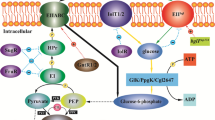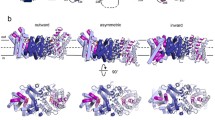Abstract
Corynebacterium glutamicum took up glutamine by a sodium-dependent secondary transport system. Both the membrane potential and the sodium gradient were driving forces. Glutamine uptake showed Michaelis-Menten kinetics, with aK m of 36 μM and aV max of 12.5 nmol min−1 (mg dry weight)−1 at pH 7. Despite a pH optimum in the alkaline range around pH 9, it was shown that uncharged glutamine is the transported species. The affinity for the cotransported sodium was relatively low; an apparentK m of 1.4 mM was determined. Among various substrates tested, only asparagine, when added in 50-fold excess, led to an inhibition of glutamine transport. It was concluded that glutamine uptake occurs via a specific transport system in symport with at least one sodium ion.
Similar content being viewed by others
Abbreviations
- CCCP :
-
Carbonylcyanide
- m :
-
chlorophenylhydrazone
- ΔΨ:
-
Membrane potential
References
Bakker EP, Mangerich WE (1981) Interconversion of components of the bacterial proton motive force by electrogenic potassium transport. J Bacteriol 147:820–826
Beck BJ, Russell JB (1994) Electrogenic glutamine uptake byPeptostreptococcus anaerobius and generation of a transmembrane potential. J Bacteriol 176:1303–1308
Berger EA (1973) Different mechanisms of energy coupling for the active transport of proline and glutamine inEscherichia coli. Proc Natl Acad Sci USA 70:1514–1518
Börmann-El Kholy ER, Eikmanns BJ, Gutmann M, Sahm H (1993) Glutamate dehydrogenase is not essential for glutamate formation byCorynebacterium glutamicum. Appl Environ Microbiol 59:2329–2331
Bröer S, Krämer R (1990) Lysine uptake and exchange inCorynebacterium glutamicum. J Bacteriol 172:7241–7248
Bröer S, Krämer R (1991) Lysine secretion byCorynebacterium glutamicum. 2. Energetics and mechanism of the transport. Eur J Biochem 202:137–143
Chen G, Russell JB (1989) Transport of glutamine byStreptococcus bovis and conversion of glutamine to pyroglutamic acid and ammonia. J Bacteriol 171:2981–2985
Ebbighausen H, Weil B, Krämer R (1989) Transport of branched-chain amino acids inCorynebacterium glutamicum. Arch Microbiol 151:238–244
Frings E, Kunte HJ, Galinski EA (1993) Compatible solutes in representatives of the generaBrevibacterium andCorynebacterium: occurrence of tetrahydropyrimidines and glutamine. FEMS Microbiol Lett 109:25–32
Jahns T (1994) Ammonium-stimulated, sodium-dependent uptake of glutamine inBacillus pasteurii. Arch Microbiol 161:207–214
Kleiner D (1985) Bacterial ammonium transport. FEMS Microbiol Rev 32:87–100
Klingenberg M, Pfaff E (1967) Means of terminating reactions. In: Estabrook RW, Pullmann MR (eds) Methods in enzymology, vol 10. Academic Press, New York, pp. 680–684
Krämer R, Lambert C (1990) Uptake of glutamate inCorynebacterium glutamicum. 2. Evidence for a primary active transport system. Eur J Biochem 194:937–944
Krämer R, Lambert C, Hoischen C Ebbighausen H (1990) Uptake of glutamate inCorynebacterium glutamicum 1. Kinetic properties and regulation by internal pH and potassium. Eur J Biochem 194:929–935
Krämer R, Boles E, Eggeling L, Erdmann A, Gutmann M, Kronemeyer W, Palmieri L, Zittrich S (1994) Mechanism and energetics of amino-acid transport in coryneform bacteria. Biochim Biophys Acta 1187:245–249
Poolman B (1987) Energy transducing processes in growing, and starving lactic acid Streptococci. PhD thesis, University of Groningen, The Netherlands
Poolman B, Smid EJ, Konings WN (1987) Kinetic properties of a phosphate-bond-driven glutamate-glutamine transport system inStreptococccus lactis andStreptococcus cremovis. J Bacteriol 169:2755–2761
Reitzer LJ, Magasanik B (1987) Ammonia assimilation and the biosynthesis of glutamine, glutamate, asparatate, asparagine,l-alanine andd-alamine. In: Neidhardt FC (ed)Escherichia coli andSalmonella typhimurium. Cellular and molecular biology, vol 1. American Society of Microbiology, Washington DC, pp 302–320
Rottenberg H (1979) The measurement of membrane potential and pH in cells, organelles and vesicles. In: Fleischer S, Packer L (eds) Methods in enzymology, vol 55. Academic Press, New York, pp 547–569
Wu L, Welker NE (1991) Cloning and characterization of a glutamine transport operon ofBacillus stearothermophilus NUB36: effect of temperature on regulation of transcription. J Bacteriol 173:4877–4888
Zaritsky A, Kihara M, Macnab RM (1981) Measurement of membrane potential inBacillus pasteurii: a comparison of lipophilic cations, rubidium ion, and a cyanine dye as probes. J Membr Biol 63:215–231
Author information
Authors and Affiliations
Corresponding author
Rights and permissions
About this article
Cite this article
Siewe, R.M., Weil, B. & Krämer, R. Glutamine uptake by a sodium-dependent secondary transport system inCorynebacterium glutamicum . Arch. Microbiol. 164, 98–103 (1995). https://doi.org/10.1007/BF02525314
Received:
Accepted:
Issue Date:
DOI: https://doi.org/10.1007/BF02525314




